人教版(2019) 选择性必修第三册 Unit 5 Poems Discover useful structures语法教案(表格式)
文档属性
| 名称 | 人教版(2019) 选择性必修第三册 Unit 5 Poems Discover useful structures语法教案(表格式) |
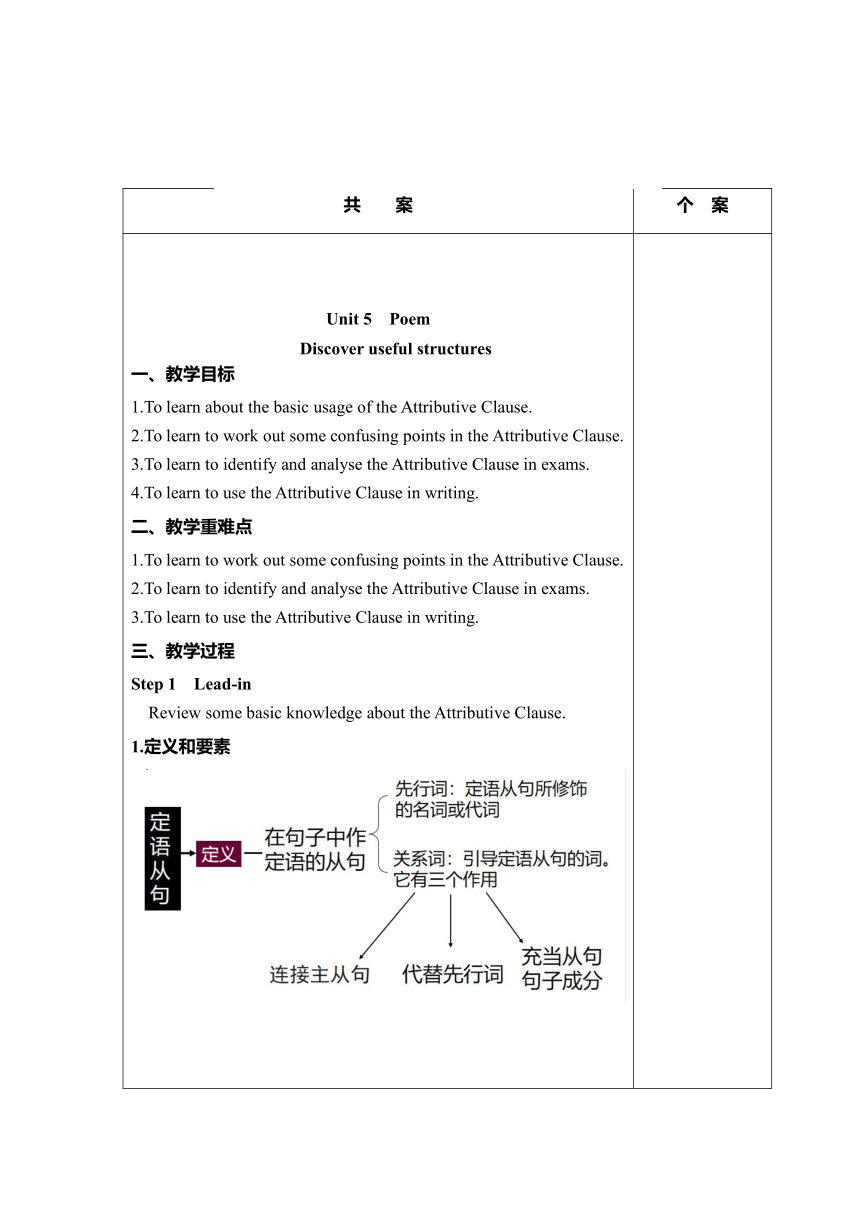
|
|
| 格式 | doc | ||
| 文件大小 | 1012.0KB | ||
| 资源类型 | 教案 | ||
| 版本资源 | 人教版(2019) | ||
| 科目 | 英语 | ||
| 更新时间 | 2022-03-31 00:00:00 | ||
图片预览

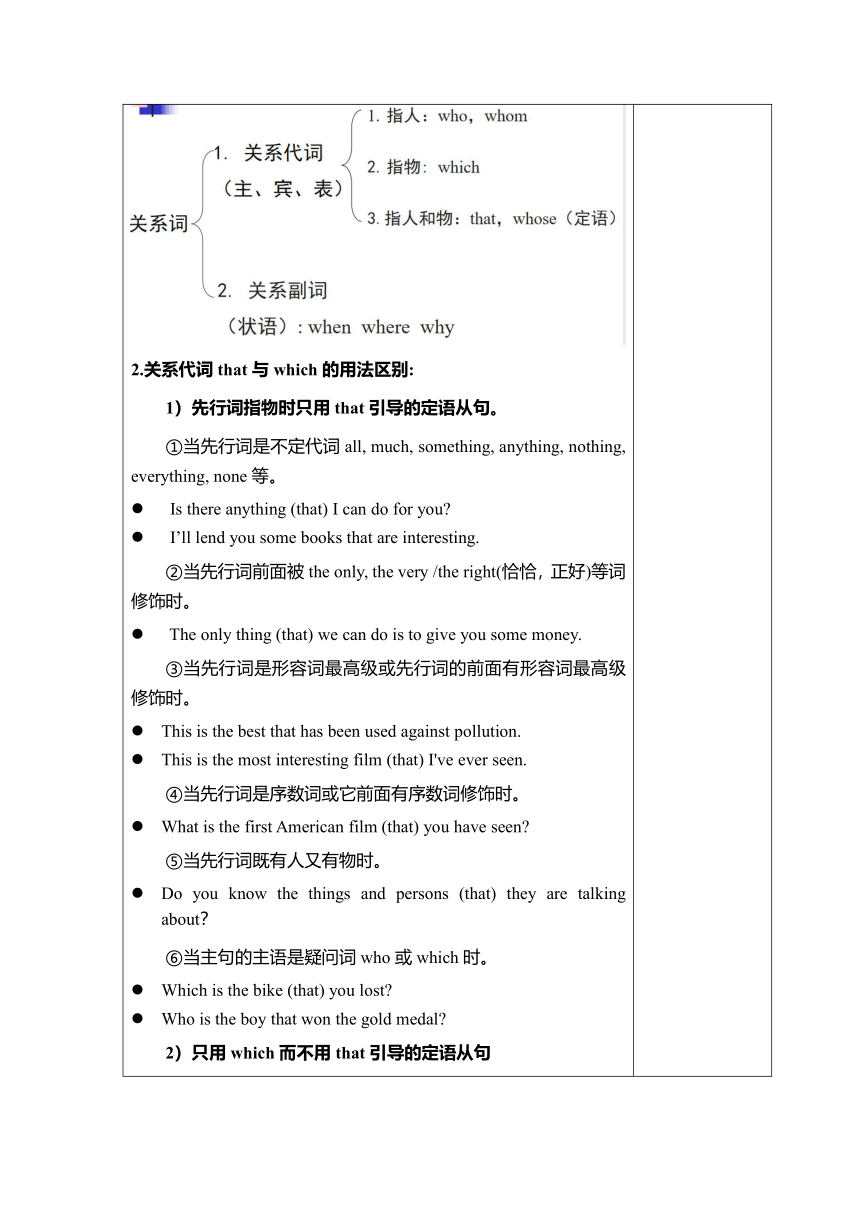
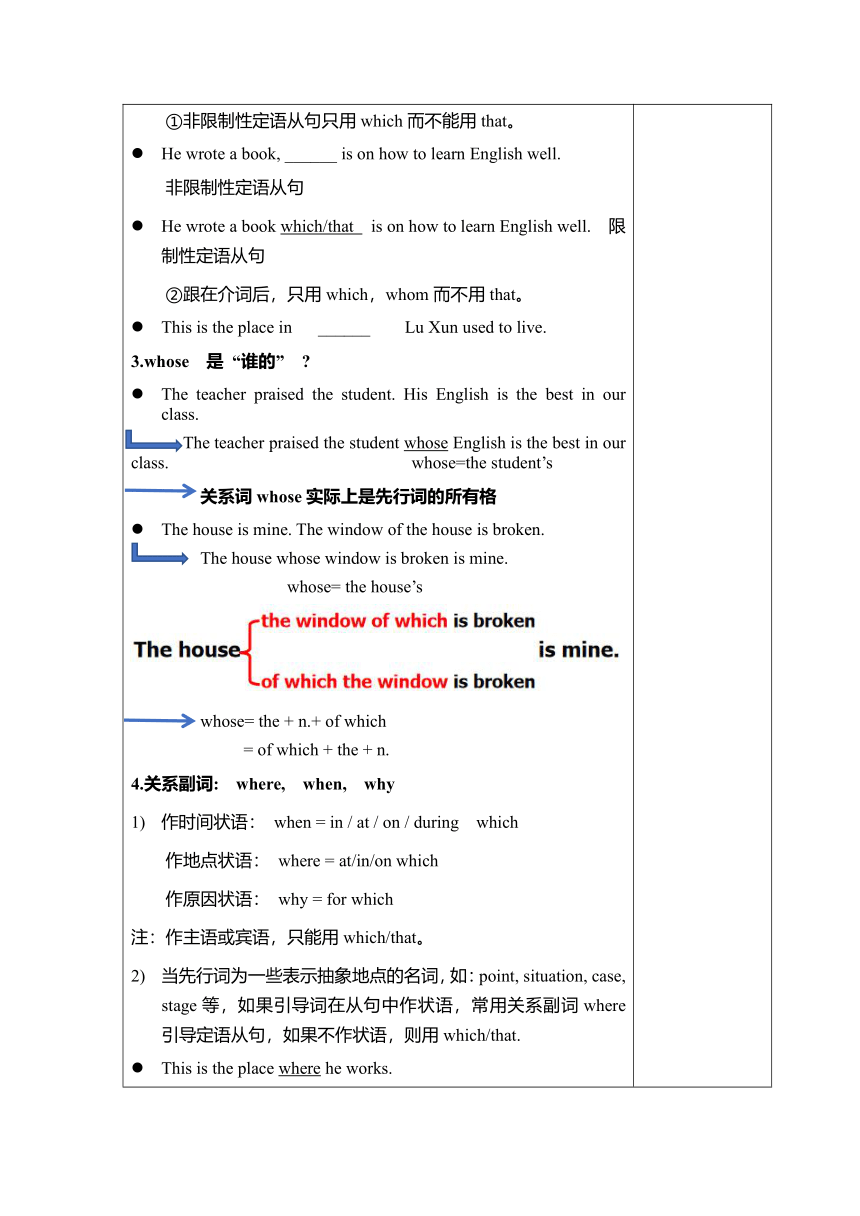
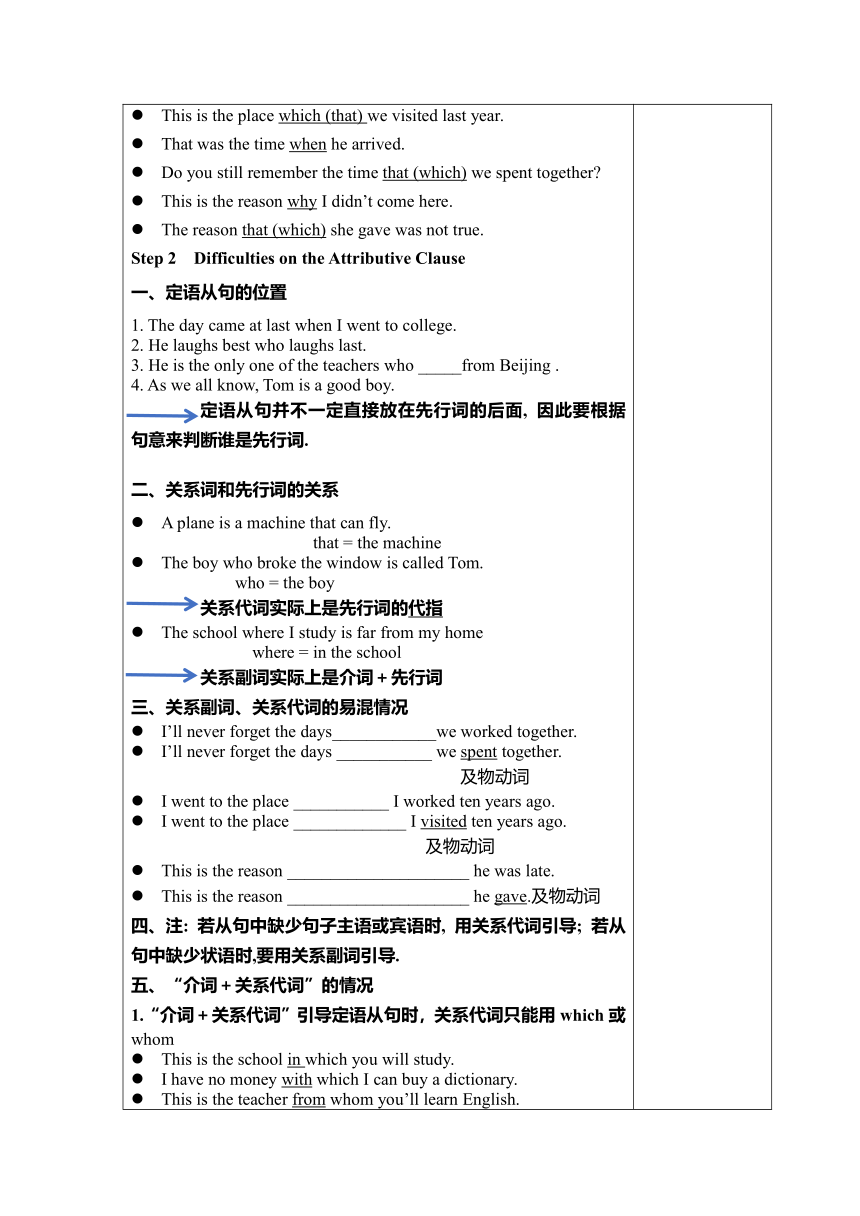
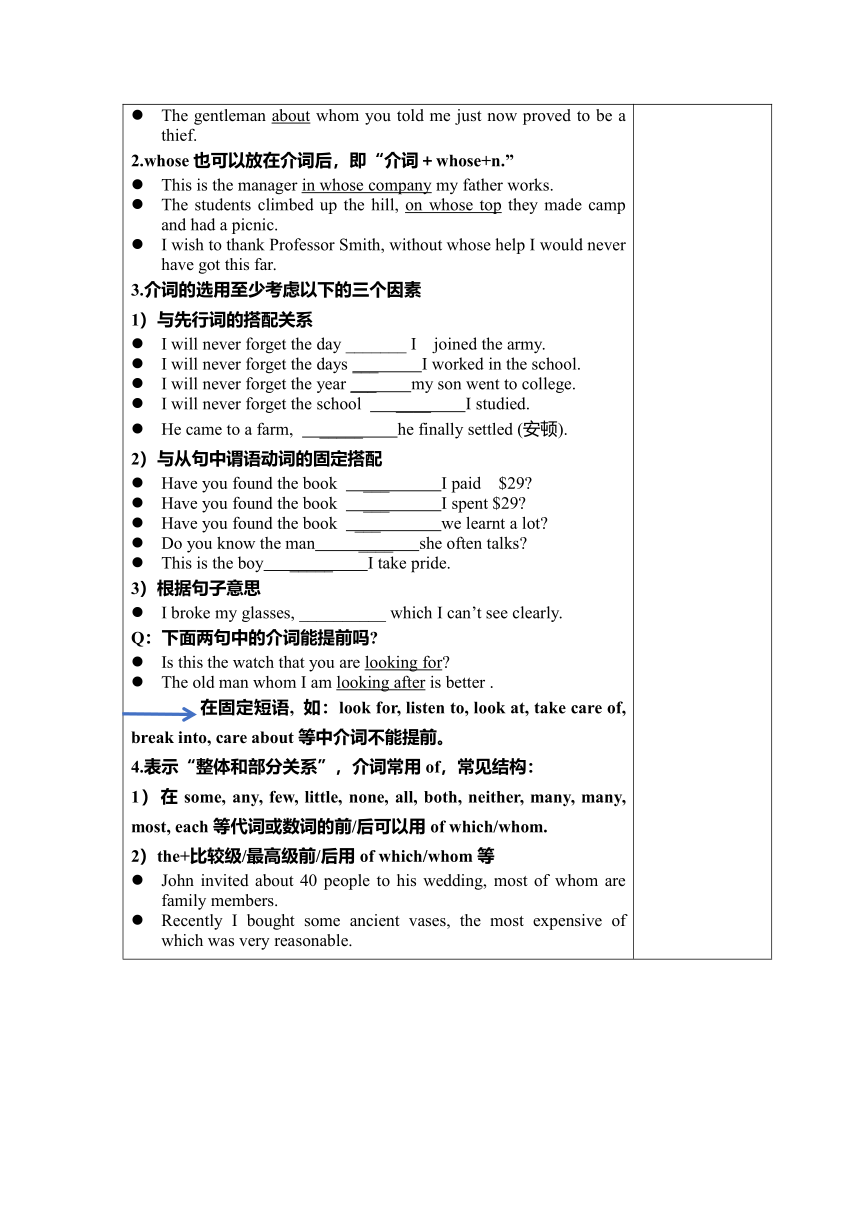
文档简介
共 案 个 案
Unit 5 PoemDiscover useful structures教学目标1.To learn about the basic usage of the Attributive Clause.2.To learn to work out some confusing points in the Attributive Clause.3.To learn to identify and analyse the Attributive Clause in exams.4.To learn to use the Attributive Clause in writing.二、教学重难点1.To learn to work out some confusing points in the Attributive Clause.2.To learn to identify and analyse the Attributive Clause in exams.3.To learn to use the Attributive Clause in writing.三、教学过程Step 1 Lead-inReview some basic knowledge about the Attributive Clause.1.定义和要素2.关系代词that与which的用法区别:1)先行词指物时只用that引导的定语从句。 ①当先行词是不定代词all, much, something, anything, nothing, everything, none等。 Is there anything (that) I can do for you I’ll lend you some books that are interesting. ②当先行词前面被the only, the very /the right(恰恰,正好)等词修饰时。 The only thing (that) we can do is to give you some money. ③当先行词是形容词最高级或先行词的前面有形容词最高级修饰时。This is the best that has been used against pollution. This is the most interesting film (that) I've ever seen.④当先行词是序数词或它前面有序数词修饰时。What is the first American film (that) you have seen ⑤当先行词既有人又有物时。Do you know the things and persons (that) they are talking about?⑥当主句的主语是疑问词who或which时。Which is the bike (that) you lost Who is the boy that won the gold medal 2)只用which而不用that引导的定语从句①非限制性定语从句只用which而不能用that。He wrote a book, ______ is on how to learn English well. 非限制性定语从句He wrote a book which/that is on how to learn English well. 限制性定语从句②跟在介词后,只用which,whom而不用that。This is the place in ______ Lu Xun used to live. 3.whose 是 “谁的” The teacher praised the student. His English is the best in our class.The teacher praised the student whose English is the best in our class. whose=the student’s 关系词whose实际上是先行词的所有格The house is mine. The window of the house is broken.The house whose window is broken is mine.whose= the house’s whose= the + n.+ of which = of which + the + n.4.关系副词: where, when, why作时间状语: when = in / at / on / during which作地点状语: where = at/in/on which作原因状语: why = for which注:作主语或宾语,只能用which/that。当先行词为一些表示抽象地点的名词,如:point, situation, case, stage等,如果引导词在从句中作状语,常用关系副词where引导定语从句,如果不作状语,则用which/that.This is the place where he works.This is the place which (that) we visited last year.That was the time when he arrived.Do you still remember the time that (which) we spent together This is the reason why I didn’t come here. The reason that (which) she gave was not true.Step 2 Difficulties on the Attributive Clause一、定语从句的位置 1. The day came at last when I went to college.2. He laughs best who laughs last.3. He is the only one of the teachers who _____from Beijing . 4. As we all know, Tom is a good boy.定语从句并不一定直接放在先行词的后面, 因此要根据句意来判断谁是先行词.二、关系词和先行词的关系A plane is a machine that can fly. that = the machineThe boy who broke the window is called Tom.who = the boy关系代词实际上是先行词的代指The school where I study is far from my homewhere = in the school关系副词实际上是介词+先行词三、关系副词、关系代词的易混情况I’ll never forget the days____________we worked together. I’ll never forget the days ___________ we spent together. 及物动词I went to the place ___________ I worked ten years ago. I went to the place _____________ I visited ten years ago. 及物动词This is the reason _____________________ he was late.This is the reason _____________________ he gave.及物动词注: 若从句中缺少句子主语或宾语时, 用关系代词引导; 若从句中缺少状语时,要用关系副词引导.“介词+关系代词”的情况1.“介词+关系代词”引导定语从句时,关系代词只能用which或whomThis is the school in which you will study. I have no money with which I can buy a dictionary. This is the teacher from whom you’ll learn English.The gentleman about whom you told me just now proved to be a thief. 2.whose也可以放在介词后,即“介词+whose+n.”This is the manager in whose company my father works.The students climbed up the hill, on whose top they made camp and had a picnic.I wish to thank Professor Smith, without whose help I would never have got this far.3.介词的选用至少考虑以下的三个因素1)与先行词的搭配关系I will never forget the day _______ I joined the army.I will never forget the days ___ I worked in the school.I will never forget the year ___ my son went to college.I will never forget the school ____ I studied.He came to a farm, _____ he finally settled (安顿).2)与从句中谓语动词的固定搭配Have you found the book ___ I paid $29 Have you found the book ___ I spent $29 Have you found the book ___ we learnt a lot Do you know the man ____ she often talks This is the boy _____ I take pride.3)根据句子意思I broke my glasses, __________ which I can’t see clearly.Q:下面两句中的介词能提前吗 Is this the watch that you are looking for The old man whom I am looking after is better .在固定短语, 如:look for, listen to, look at, take care of, break into, care about等中介词不能提前。4.表示“整体和部分关系”,介词常用of,常见结构:1)在some, any, few, little, none, all, both, neither, many, many, most, each等代词或数词的前/后可以用of which/whom.2)the+比较级/最高级前/后用of which/whom等John invited about 40 people to his wedding, most of whom are family members.Recently I bought some ancient vases, the most expensive of which was very reasonable.练习:as 引导的非限制性定语从句1. The earth is round._____ is known to all.2. The earth is round,_____ is known to all.3. _____ is known to all, the earth is round.______ is known to all that the earth is round.as作关系代词引导非限制性定语从句,意为“正如,正像”,可放在句首/句中/句末。与之搭配的动词一般是固定的,如:as (it) often happens, as I remember, as is often the case, as you know, as is expected, as is known to us, as is shown等注:as引导的定语从句与结果状语从句的区别as引导的定语从句与what/it引导的主语从句的区别定语从句和并列句的比较方法:去掉引导词,划分句子成分,成分完整、句意完整是强调句(指物用that,指人用that或who),反之则是定语从句定语从句和强调句型的区分 方法:去掉引导词,划分句子成分,句子成分完整、句子意思完整是强调句,反之则是定语从句。定语从句与状语从句的误判1. When you read books, you had better make a mark _________you have any questions. 2. When you read books, you had better make a mark at the spot _________you have any questions.that引导的限制性定语从句与同位语从句的区别1. There’s a feeling in me _______ we will never know what a UFO is—not ever. 2. We don’t believe in the news _______ he told us yesterday.3. He told us the news_________ our team had won the game.方法:去掉引导词,划分句子成分,成分完整是同位语从句,反之则是定语从句; 定语从句起到修饰限定先行词的作用,而同位语从句是对名词的内容进行解释说明。十、在先行词way 和reason后错用关系词1. The way _______________he explained to us was quite simple.2. I dislike the way _____________he talks to his mother.3. Have you asked her for the reason______________ may explain her absence? 4. I don’t believe the reason _______________ he has given for his being late.5. The reason ___________ you were late for school did not make any sense.way作先行词:定语从句缺少主语或宾语,用which/that;缺状语,用in which/that/省略。reason作先行词:定语从句缺少主语或宾语,用which/that;缺状语,用why。十一、定语从句中主谓一致(1) This is one of the rooms that ________ (be)damaged in the fire. This is the only one of the rooms that _______ (be)damaged in the fire.(2)The university in France that I am applying for _______(have) its own requirement. 定语从句谓语动词的形式由先行词决定。Step 3 易错对比练习1. 1)Mr Li has three daughters, none of _____ is an engineer. 2)Mr Li has three daughters, but none of _____ is a dancer. 2. 1) It was eleven o’clock _____ they went out of the cinema. 2) It was at eleven o’clock _____ they went out of the cinema.3 .1) It was in the hospital____ he came across a friend of his. 2)It was the hospital____ he came across a friend of his. 4. 1). We should go to the place_____we are most needed. 2). We should go to the place_____needs us most.5. 1). Mother didn't come back on December 25, _____was my birthday. 2). Mother didn't come back home on December 25, _____she was busy working.6.1). This is the room_____he lived in his childhood. 2). This is the room_____he lived in last year.7. 1) The teacher didn’t know the reason _______ she was absent yesterday 2) The teacher couldn’t accept the reason _______ she explained yesterday 8.1) We must learn to act in ways ______do not harm other living things. 2) I don’t like the way _____ he spoke to his mother. 3) This is the way ____ he thought of to solve the problem.9.1).He is such a good teacher ______ we all like.2). He is such a good teacher ______ we all like him.3). He is a good teacher, _____ makes us respect him.10. 1)Rice doesn’t grow well _____ there is not enough water. 2)I still remember the farm_____ my parents worked ten years ago.3) The visitor asked the guide to take his picture _____ stands the famous tower. 11.1) _____ we all know, China is rich in natural resources. 2) _____ is well-known that China is rich in natural resources. 3) _____ is well-known to us all is that China is rich in natural resources.12. 1) I’m surprised at all _____ he said at the meeting. 2) I’m surprised at _____ he said at the meeting. 13. 1) _____ leaves the room last ought to turn off the lights.2) _____ who leaves the room last ought to turn off the lights.3) _____ who leave the room last ought to turn off the lights.14.1)This is one of the most interesting films _____ shown last week.2)This is the very one of the most interesting films _____ shown last week. 15.1) He still lives in the room _____ window faces to the east. 2) He still lives in the room, the window _____ which faces to the east. 3) He still lives in the room _____ is in the north of the city. 4) He still lives in the room _____ there is a beautiful table.纠正以下各句中的错误:1.Some of the boys I invited them didn’t come. 2.The book that you need it is in the library. 3. Anyone who break the law will be punished. 4. Those who has finished may go home. 5. He is the only one of the teachers who know French in our school. 6. English is a language shared by several diverse cultures, each of which use it differently.7. Children eat a lot of sugar often have bad teeth. 8. That evening, when I will tell you more about later, I ended up working very late. 9.The exact year when Angela and her family spent together in China was 2008. 10. I still remember the day on when I first came to Beijing. 11. Is this book that your teacher gave you yesterday 12. When we got home, we went to the store where sold us the GPS.Step 4 语填/改错/写作中的定语从句1)在语法填空中:1.找出主句、从句;2.判断从句是否完整;3.完整,填关系副词“3 wh”,不完整,填关系代词:指人填who/whom/that/as;指物填which /that/as;表示“先行词的”用whose2)在改错中:1.看形式 2.看关系词3)在写作中:写-找-换-连Step 5 HomeworkRevise the usage of the Attributive Clause.Do some reflection about the exercise of the Attributive Clause.教后反思(不少于100字)
Unit 5 PoemDiscover useful structures教学目标1.To learn about the basic usage of the Attributive Clause.2.To learn to work out some confusing points in the Attributive Clause.3.To learn to identify and analyse the Attributive Clause in exams.4.To learn to use the Attributive Clause in writing.二、教学重难点1.To learn to work out some confusing points in the Attributive Clause.2.To learn to identify and analyse the Attributive Clause in exams.3.To learn to use the Attributive Clause in writing.三、教学过程Step 1 Lead-inReview some basic knowledge about the Attributive Clause.1.定义和要素2.关系代词that与which的用法区别:1)先行词指物时只用that引导的定语从句。 ①当先行词是不定代词all, much, something, anything, nothing, everything, none等。 Is there anything (that) I can do for you I’ll lend you some books that are interesting. ②当先行词前面被the only, the very /the right(恰恰,正好)等词修饰时。 The only thing (that) we can do is to give you some money. ③当先行词是形容词最高级或先行词的前面有形容词最高级修饰时。This is the best that has been used against pollution. This is the most interesting film (that) I've ever seen.④当先行词是序数词或它前面有序数词修饰时。What is the first American film (that) you have seen ⑤当先行词既有人又有物时。Do you know the things and persons (that) they are talking about?⑥当主句的主语是疑问词who或which时。Which is the bike (that) you lost Who is the boy that won the gold medal 2)只用which而不用that引导的定语从句①非限制性定语从句只用which而不能用that。He wrote a book, ______ is on how to learn English well. 非限制性定语从句He wrote a book which/that is on how to learn English well. 限制性定语从句②跟在介词后,只用which,whom而不用that。This is the place in ______ Lu Xun used to live. 3.whose 是 “谁的” The teacher praised the student. His English is the best in our class.The teacher praised the student whose English is the best in our class. whose=the student’s 关系词whose实际上是先行词的所有格The house is mine. The window of the house is broken.The house whose window is broken is mine.whose= the house’s whose= the + n.+ of which = of which + the + n.4.关系副词: where, when, why作时间状语: when = in / at / on / during which作地点状语: where = at/in/on which作原因状语: why = for which注:作主语或宾语,只能用which/that。当先行词为一些表示抽象地点的名词,如:point, situation, case, stage等,如果引导词在从句中作状语,常用关系副词where引导定语从句,如果不作状语,则用which/that.This is the place where he works.This is the place which (that) we visited last year.That was the time when he arrived.Do you still remember the time that (which) we spent together This is the reason why I didn’t come here. The reason that (which) she gave was not true.Step 2 Difficulties on the Attributive Clause一、定语从句的位置 1. The day came at last when I went to college.2. He laughs best who laughs last.3. He is the only one of the teachers who _____from Beijing . 4. As we all know, Tom is a good boy.定语从句并不一定直接放在先行词的后面, 因此要根据句意来判断谁是先行词.二、关系词和先行词的关系A plane is a machine that can fly. that = the machineThe boy who broke the window is called Tom.who = the boy关系代词实际上是先行词的代指The school where I study is far from my homewhere = in the school关系副词实际上是介词+先行词三、关系副词、关系代词的易混情况I’ll never forget the days____________we worked together. I’ll never forget the days ___________ we spent together. 及物动词I went to the place ___________ I worked ten years ago. I went to the place _____________ I visited ten years ago. 及物动词This is the reason _____________________ he was late.This is the reason _____________________ he gave.及物动词注: 若从句中缺少句子主语或宾语时, 用关系代词引导; 若从句中缺少状语时,要用关系副词引导.“介词+关系代词”的情况1.“介词+关系代词”引导定语从句时,关系代词只能用which或whomThis is the school in which you will study. I have no money with which I can buy a dictionary. This is the teacher from whom you’ll learn English.The gentleman about whom you told me just now proved to be a thief. 2.whose也可以放在介词后,即“介词+whose+n.”This is the manager in whose company my father works.The students climbed up the hill, on whose top they made camp and had a picnic.I wish to thank Professor Smith, without whose help I would never have got this far.3.介词的选用至少考虑以下的三个因素1)与先行词的搭配关系I will never forget the day _______ I joined the army.I will never forget the days ___ I worked in the school.I will never forget the year ___ my son went to college.I will never forget the school ____ I studied.He came to a farm, _____ he finally settled (安顿).2)与从句中谓语动词的固定搭配Have you found the book ___ I paid $29 Have you found the book ___ I spent $29 Have you found the book ___ we learnt a lot Do you know the man ____ she often talks This is the boy _____ I take pride.3)根据句子意思I broke my glasses, __________ which I can’t see clearly.Q:下面两句中的介词能提前吗 Is this the watch that you are looking for The old man whom I am looking after is better .在固定短语, 如:look for, listen to, look at, take care of, break into, care about等中介词不能提前。4.表示“整体和部分关系”,介词常用of,常见结构:1)在some, any, few, little, none, all, both, neither, many, many, most, each等代词或数词的前/后可以用of which/whom.2)the+比较级/最高级前/后用of which/whom等John invited about 40 people to his wedding, most of whom are family members.Recently I bought some ancient vases, the most expensive of which was very reasonable.练习:as 引导的非限制性定语从句1. The earth is round._____ is known to all.2. The earth is round,_____ is known to all.3. _____ is known to all, the earth is round.______ is known to all that the earth is round.as作关系代词引导非限制性定语从句,意为“正如,正像”,可放在句首/句中/句末。与之搭配的动词一般是固定的,如:as (it) often happens, as I remember, as is often the case, as you know, as is expected, as is known to us, as is shown等注:as引导的定语从句与结果状语从句的区别as引导的定语从句与what/it引导的主语从句的区别定语从句和并列句的比较方法:去掉引导词,划分句子成分,成分完整、句意完整是强调句(指物用that,指人用that或who),反之则是定语从句定语从句和强调句型的区分 方法:去掉引导词,划分句子成分,句子成分完整、句子意思完整是强调句,反之则是定语从句。定语从句与状语从句的误判1. When you read books, you had better make a mark _________you have any questions. 2. When you read books, you had better make a mark at the spot _________you have any questions.that引导的限制性定语从句与同位语从句的区别1. There’s a feeling in me _______ we will never know what a UFO is—not ever. 2. We don’t believe in the news _______ he told us yesterday.3. He told us the news_________ our team had won the game.方法:去掉引导词,划分句子成分,成分完整是同位语从句,反之则是定语从句; 定语从句起到修饰限定先行词的作用,而同位语从句是对名词的内容进行解释说明。十、在先行词way 和reason后错用关系词1. The way _______________he explained to us was quite simple.2. I dislike the way _____________he talks to his mother.3. Have you asked her for the reason______________ may explain her absence? 4. I don’t believe the reason _______________ he has given for his being late.5. The reason ___________ you were late for school did not make any sense.way作先行词:定语从句缺少主语或宾语,用which/that;缺状语,用in which/that/省略。reason作先行词:定语从句缺少主语或宾语,用which/that;缺状语,用why。十一、定语从句中主谓一致(1) This is one of the rooms that ________ (be)damaged in the fire. This is the only one of the rooms that _______ (be)damaged in the fire.(2)The university in France that I am applying for _______(have) its own requirement. 定语从句谓语动词的形式由先行词决定。Step 3 易错对比练习1. 1)Mr Li has three daughters, none of _____ is an engineer. 2)Mr Li has three daughters, but none of _____ is a dancer. 2. 1) It was eleven o’clock _____ they went out of the cinema. 2) It was at eleven o’clock _____ they went out of the cinema.3 .1) It was in the hospital____ he came across a friend of his. 2)It was the hospital____ he came across a friend of his. 4. 1). We should go to the place_____we are most needed. 2). We should go to the place_____needs us most.5. 1). Mother didn't come back on December 25, _____was my birthday. 2). Mother didn't come back home on December 25, _____she was busy working.6.1). This is the room_____he lived in his childhood. 2). This is the room_____he lived in last year.7. 1) The teacher didn’t know the reason _______ she was absent yesterday 2) The teacher couldn’t accept the reason _______ she explained yesterday 8.1) We must learn to act in ways ______do not harm other living things. 2) I don’t like the way _____ he spoke to his mother. 3) This is the way ____ he thought of to solve the problem.9.1).He is such a good teacher ______ we all like.2). He is such a good teacher ______ we all like him.3). He is a good teacher, _____ makes us respect him.10. 1)Rice doesn’t grow well _____ there is not enough water. 2)I still remember the farm_____ my parents worked ten years ago.3) The visitor asked the guide to take his picture _____ stands the famous tower. 11.1) _____ we all know, China is rich in natural resources. 2) _____ is well-known that China is rich in natural resources. 3) _____ is well-known to us all is that China is rich in natural resources.12. 1) I’m surprised at all _____ he said at the meeting. 2) I’m surprised at _____ he said at the meeting. 13. 1) _____ leaves the room last ought to turn off the lights.2) _____ who leaves the room last ought to turn off the lights.3) _____ who leave the room last ought to turn off the lights.14.1)This is one of the most interesting films _____ shown last week.2)This is the very one of the most interesting films _____ shown last week. 15.1) He still lives in the room _____ window faces to the east. 2) He still lives in the room, the window _____ which faces to the east. 3) He still lives in the room _____ is in the north of the city. 4) He still lives in the room _____ there is a beautiful table.纠正以下各句中的错误:1.Some of the boys I invited them didn’t come. 2.The book that you need it is in the library. 3. Anyone who break the law will be punished. 4. Those who has finished may go home. 5. He is the only one of the teachers who know French in our school. 6. English is a language shared by several diverse cultures, each of which use it differently.7. Children eat a lot of sugar often have bad teeth. 8. That evening, when I will tell you more about later, I ended up working very late. 9.The exact year when Angela and her family spent together in China was 2008. 10. I still remember the day on when I first came to Beijing. 11. Is this book that your teacher gave you yesterday 12. When we got home, we went to the store where sold us the GPS.Step 4 语填/改错/写作中的定语从句1)在语法填空中:1.找出主句、从句;2.判断从句是否完整;3.完整,填关系副词“3 wh”,不完整,填关系代词:指人填who/whom/that/as;指物填which /that/as;表示“先行词的”用whose2)在改错中:1.看形式 2.看关系词3)在写作中:写-找-换-连Step 5 HomeworkRevise the usage of the Attributive Clause.Do some reflection about the exercise of the Attributive Clause.教后反思(不少于100字)
